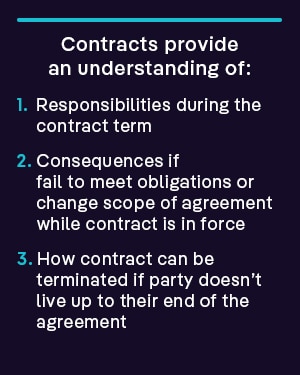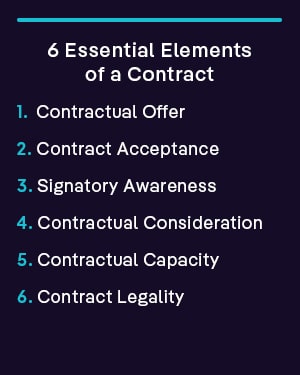Companies enter into contracts for many reasons, such as buying and selling goods and services, establishing partnerships, and managing employment relationships. Some contracts are remarkably simple, while others are extremely complex. Yet no matter why a business agreement is published or how intricate it is, some elements of a contract can’t be omitted or ignored.
Maybe you are new to enterprise contract management. Or you might be working on improving your organization’s existing contract practices and workflow efficiencies. Whatever your reason – read on to discover more about the essential elements of contracts.

When is a Contract Needed?
Individuals and businesses use contracts to protect their legal rights when conducting business with
another party. For example, a contract might be used to ensure one of the parties gets paid for
providing services or delivering products to the other. Or it could be to protect intellectual property
rights or confidentiality during a joint venture project.
Contracts provide the parties to the agreement with an understanding of:
- Their responsibilities during the contract term,
- The consequences if either party fails to meet their obligations or wishes to change the scope of the agreement while the contract is in force, and
- How a contract can be terminated if the other party doesn’t live up to their end of the agreement.
Is It Necessary for a Contract to Be Written?
Although oral-only contracts might be enforceable, they’re typically not seen in a business context. If I agree to buy an ice cream for my friend, that is a contract – but at a corporate level, written contracts are the lifeblood of the company.
The average Fortune 500 company has between 20,000 to 40,000 active contracts. If they’re all managed manually, it can put undue pressure on legal teams and negatively affect deal flow. For many departments, that means turning to contract management software to get agreements drafted and redlined faster.
How is a Contract Interpreted?
Ideally, professionals interpret a contract by reviewing its terms on the page. These should not be open to interpretation. It is important for contract language to be concise, unambiguous, rich with context, and jargon-free.
If the business relationships and events do not unfold according to the contract, a straightforward, readable, clear agreement can significantly reduce the time spent interpreting, arguing, and disputing any issues that might arise.
The 6 Essential Elements of a Contract
Ensure these contract elements are clear and present in your agreements. It will make it easier for your negotiating partner to agree to your terms, providing all parties have visibility to the contract throughout the negotiation process and after signoff. Keep in mind that these elements can Legal be present in many ways; the way they occur in one agreement may be different than the next.
Contractual Offer
When an offeror (or offering party) – a buyer, a seller, or an aspiring business partner – proposes to do business with an offeree (the party that receives the offer), you have a contractual offer. It should be easy to identify the offeror’s willingness to enter into a relationship with the other party should it be accepted by the offeree.
The offer should contain essential contract terms, such as price, volume, and descriptions of the products purchased or services performed. In most situations, an offer can be withdrawn or terminated before it is accepted by the offeree.
Contract Acceptance
Contract acceptance is agreeing to enter into a legally binding agreement based on an offer presented by another party. Acceptance is typically signaled through an ink or digital signature – but can also be demonstrated when the offeree acts in a way that suggests acceptance of the contract terms. For example, if a seller delivers goods based on a purchase offer, they are signaling their acceptance to be paid the offeror’s price. Offers typically have defined windows of acceptance, so acceptance after a “valid until” date does not qualify as acceptance.
Acceptance can’t be conditional, such as if one party makes a counteroffer. Silence usually does not represent an offeree’s willingness to be bound by contract terms. Some contracts include options, such as escape clauses or exclusive rights to accept within a defined period. Offers cannot be accepted by another party, and an offeree cannot change the agreement while accepting it. They have to request modified terms before signing.
Signatory Awareness
It is important that all parties to a contract understand the terms, implications, and consequences of a contract. It is important that terms are thoroughly reviewed before acceptance to ensure your company doesn’t agree to obligations it can’t meet. Both parties should be aware they are entering into a contract as active participants and are willing to personally, or on behalf of their company, be bound by all of the contract terms.
If, in court, one party is found to have been coerced into agreeing to the contract terms, or if a party is found to have lied and misrepresented their ability to live up to the contract terms, the agreement can be voided.
Contractual Consideration
The agreed-upon value of a contract – financial or action-wise – is what contract legal professionals call consideration. Consideration can be money, an action (or an agreement not to act), or anything that is deemed to have value. In some contracts, you’ll even see consideration stated to be a peppercorn!
Contractual Capacity
Capacity — the ability to understand what a contract means and take legal action — is a key requirement for entering into any agreement. Some entities, like minor children, individuals with mental disabilities, and people under the influence of drugs and alcohol are considered to not have the capacity to enter into a contract of any kind.
Since a lack of contractual capacity can void a contract in court, it is up to all parties to ensure they understand the responsibilities they are burdening themselves or their company with when agreeing to a contract.
Contract Legality
Whether your business operates locally, nationally, or internationally, it is important to declare the legal jurisdiction which will dictate the legality of the contract. For example, if you’ve been forced into a contract against your will — such as with financial, physical, or personal harm if they don’t agree to contract terms — you might enter into the contract under duress. Contracts for illegal purposes cannot be enforced. Federal, state/provincial, and local laws often differ, so both parties need to do their due diligence when doing business with suppliers and service providers from outside their jurisdiction.
Use AI to Easily Create Contracts
From contract authoring through to review and analytics, an AI-powered contract lifecycle management (CLM) platform can help ensure these essential elements of a contract are in place. They can also ensure contract language is concise and consistent and obligations are met on time. Reviewing your contracts with the knowledge of these six elements means that your agreement will likely be valid, enforceable, and actionable.
For information about ContractPodAi’s contract management software, please visit our website.



